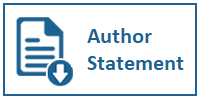PENGARUH MOTIVASI, PENGETAHUAN PERPAJAKAN, DAN SANKSI PAJAK TERHADAP KEPATUHAN PAJAK (STUDI KASUS PADA WAJIB PAJAK ORANG PRIBADI DI WILAYAH KANTOR PELAYANAN PAJAK PRATAMA YOGYAKARTA)
DOI:
https://doi.org/10.31937/akuntansi.v15i1.3162Abstract
Abstract” This study aims to determine the effect of Motivation, Tax Knowledge, and Tax Sanctions on Tax Compliance in the Yogyakarta Primary Tax Service Office. The purpose of this research is motivated by the low compliance of individual taxpayers in fulfilling their obligations in the field of taxation. This research was conducted using a quantitative approach. The research data is in the form of primary data and data collection is carried out by distributing questionnaires to individual taxpayers in the Region of the Yogyakarta Primary Tax Service Office. The sampling technique used probability sampling with a sample size of 125 respondents. Data analysis technique using multiple linear regression analysis method. The conclusion of this study shows that Tax Motivation and Knowledge have an effect on Tax Compliance, while Tax Sanctions have no effect on Tax Compliance in the Region of the Yogyakarta Primary Tax Service Office. It is known from the Tax Motivation and Knowledge that it has a t count > t table with a significant value <0.05, which means that with an increase in Tax Motivation and Knowledge owned by each taxpayer, it will also increase tax compliance. Tax sanctions have a value of t count < t table with a significant value > 0.05 which indicates that administrative sanctions and criminal sanctions given to taxpayers do not cause a deterrent effect in tax compliance.
Keywords: Motivation; Knowledge; Sanctions; Compliance; Taxes
Downloads
Downloads
Published
How to Cite
Issue
Section
License
Authors retain copyright and grant the journal right of first publication with the work simultaneously licensed under a Creative Commons Attribution-ShareAlike International License (CC-BY-SA 4.0) that allows others to share the work with an acknowledgement of the work's authorship and initial publication in this journal.
Authors are able to enter into separate, additional contractual arrangements for the non-exclusive distribution of the journal's published version of the work (e.g., post it to an institutional repository or publish it in a book), with an acknowledgement of its initial publication in this journal.
















